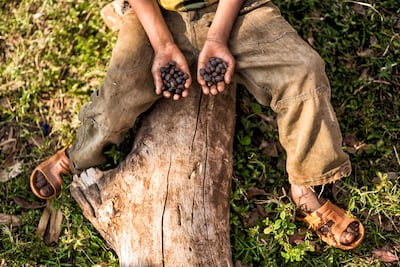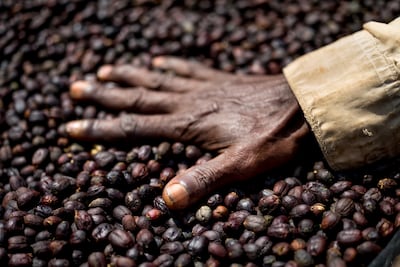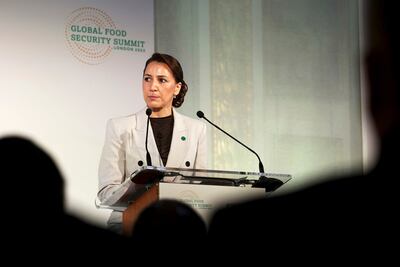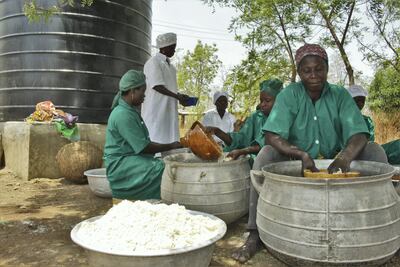Botanist Dr Aaron Davis spent years exploring the forgotten species in the collections at London's Kew Gardens.
His research has led to a once-in-a-lifetime discovery of a species which was feared to be extinct but could help in the fight to protect coffee from climate change.
It could now help protect millions of livelihoods in the process.
Dr Davis has been researching more than 100 species of coffee which have been collected and preserved in the vaults at Kew's herbarium for more than a century – but has assessed that 60 per cent of them are now extinct.
He discovered that one of the rare plants, Coffea stenophylla, which has been kept untouched for decades, has the unique combination of tolerance to high temperatures and a superior flavour which could hold the key to climate resilience.
The importance of his team’s work was highlighted this month when the UK hosted the global food security summit alongside Somalia, the UAE, the Children’s Investment Fund Foundation and the Bill & Melinda Gates Foundation.
It saw Prime Minister Rishi Sunak announce a new virtual hub to link UK scientists with global research initiatives aiming to develop climate and disease-resistant crops.
Rises in temperatures threaten coffee crops
Rises in global temperatures due to climate change are threatening coffee crops as 99 per cent of the world’s consumption relies on just two species – Arabica and Robusta – which require a mean annual temperature of 19C to 23C respectively.
But with 2022 being the sixth warmest year on record and temperatures increasing every year the pressure is on to find new solutions.
“I started working with coffee in the late 1990s and in 2010 I got interested in the influence of climate change on coffee production and the impact on wild coffee species,” Dr Davis told The National.
“I spent eight years looking at the threats to wild coffee and coffee production under climate change risks and opportunities focused on studies in Ethiopia looking at Arabica to get a clearer understanding on what the impact would be on coffee production in that country and how and what are the potential means of adapting to climate change.
“During our research, we looked at what we would need to do for adoption. We looked at three different options: firstly move coffee to more climatic areas, secondly, make farms more climate smart and thirdly change coffee crops and move from Arabica and Robusta.”
Scientists battle to find climate-resilient crops
He and his team decided to investigate new alternative species to see if they had the ability to survive droughts and floods.
“We are still actually working on these paths but the focus is on changing the coffee crop to something that is more climate resistant and able to withstand droughts,” he said.

“Our main focus is developing coffee crop species that will be truly climate resistant to provide something for farmers to continue growing coffee if they want. There is the potential to develop new coffee crop species.
“We looked through the archives here at Kew where we have a large amount of data, we looked at species which have the potential and were used back in the 19th century and early 20th century and had been forgotten and were dropped in favour of Arabica and Robusta.
“From that, we made a list of species that had the potential to be drought tolerant and had heat tolerant attributes, not just for increases in temperature but shifts in rainfall patterns.
“Ultimately we need to preserve things in situ in the wild that are already adapted to the environment. We need living collections that breeders can access quickly and develop.
“We need products which are climate resistant and pest resistant and realise a high yield.”

It led to Dr Davis and his team launching an expedition to try to find the world’s forgotten Coffea stenophylla crops in the hope they might still exist somewhere.
“It was last seen in Sierra Leone in 1954 in the wild and there was a possible sighting in the 1980s in the Ivory Coast, so we focused on searching for it in Sierra Leone,” he told The National.
“I was part of a team sent to search for it and my job was to identify it if we found it. We didn’t know exactly where to look, after lots of searching by chance we came upon one single plant, but we needed a healthy crop to know it could thrive.”
As they widened their search they feared it had been in vain as they failed to find any other surviving plants.
But by chance, a local farmer from a different region who had joined the search said the crop looked similar to ones growing in the area where he lived.

“We went to look and after quite a search and many hours walking we came across quite a healthy crop,” he said.
“It was a really exciting find, we were beginning to think we wouldn’t find any. Since then it has been an exciting few years.
“We are now working to propagate them and produce lots of seedlings in various locations to do trials and see how they perform and if they are versatile for farmers to grow.”
The team has had more than 1,500 enquiries from farmers looking to utilise the crop.
“We know the risks and the impacts for coffee farmers,” he said.
“In Ethiopia, we are doing a lot of work to see where coffee crops could be moved to, higher ground for example.
“If the weather gets warmer by just half a degree it could weaken the plant.
“Future-proofing the coffee supply chain to deal with climate change is vital – coffee drives a multibillion-dollar global industry, supports the economy of several tropical countries, and provides livelihoods for more than 100 million coffee farmers.
“To find a coffee species that flourishes at higher temperatures and has an excellent flavour is a once-in-a-lifetime scientific discovery – this species could be essential for the future of high-quality coffee.”

Mariam Al Mheiri. Minister of Climate Change and Environment, Minister of State for Food Security, says growing sustainable food to tackle the climate crisis will top the agenda at the Cop28 summit.
“Our own contribution to the cause is to really elevate this agenda and place it at the very heart of presidential action agenda,” Ms Al Mheiri said at the UK global food security summit.
With 90 per cent of calories coming from just 15 crops, the team at Kew are working to revive other forgotten super crops which will help future food security.
It comes as grain issues highlighted by the war in Ukraine put the issue of food security high up the agenda.
Africa's forgotten super cereal shows climate resilience
One superfood, which is popular in Africa but has been forgotten globally until now, is fonio.
It is a cereal which comes from grasses and is used to make couscous, porridge and drinks.
It has a unique quality in that it can tolerate dry conditions and can mature within six weeks.
Kew researcher George Burton believes Fonio will be able to support communities during devastating crop losses due to droughts.
“The crop fonio was once a staple food across West Africa, renowned for its quick growth, tolerance to dry and nutrient-poor soils, and relatively strong nutritional profile. These traits provide a strongly climate-resilient plant, which can support communities during devastating crop losses due to droughts,” he said.
“Fonio has been grown for thousands of years in West Africa but it is now a crop of focus as it is resilient in extreme climates such as droughts and erratic weather and high in nutrients.
“It has gained a lot of attention over the last decade and has been promoted as a new wonder crop.

“As much as possible the work at Kew is aimed at what farmers want to get out of it, what issues they are having and what they would like to see in 10 years.
“We are working with them to see what problems they are having. Maybe the grains are too small or it is difficult to process and what changes can be made so people can depend on it in the future? We are trying to keep the emphasis on the farmers.”
For the food chain as a whole, Kew’s scientists are acutely aware of the race against time they face in trying to find the next climate-resilient crop.
“Farmers need other options and we need a bigger portfolio that’s sustainable,” Dr Davis said.
“When you look at the hard facts it's extremely worrying and we need to look at new options.”








